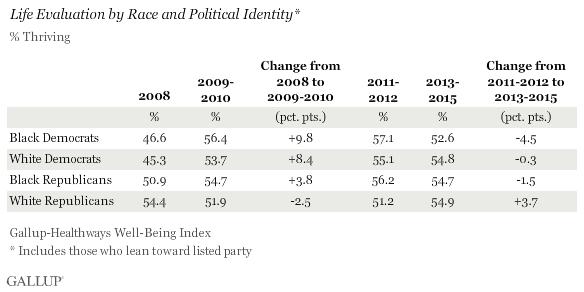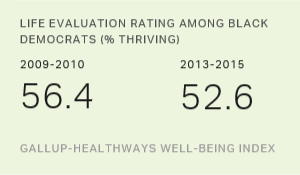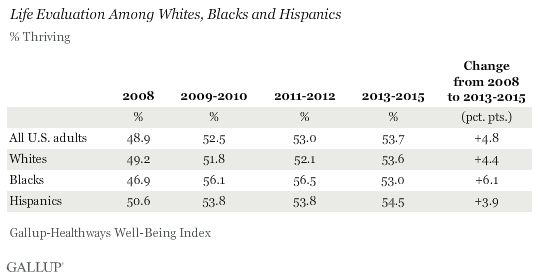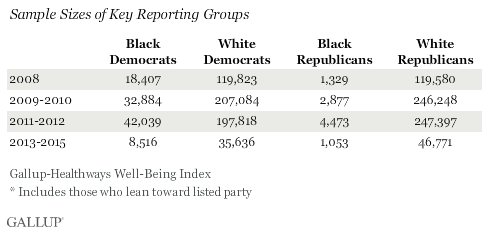Story Highlights
- Blacks of both parties evaluated lives better after Obama was first elected
- White Republicans evaluated lives worse after Obama's first term
- Black Democrats' life ratings have partially slipped during second term
WASHINGTON, D.C. -- Within the first two years after President Barack Obama's inauguration in January 2009, blacks' average life evaluation rating increased. Black Democrats' overall rating rose especially sharply, but black Republicans' rating also improved. During Obama's second term, however, black Democrats' average life evaluation rating has worsened, although it remains better than in 2008, before Obama took office.

Gallup and Healthways measure Americans' life evaluations as part of the Gallup-Healthways Well-Being Index. Gallup and Healthways classify Americans as "thriving," "struggling" or "suffering" according to how they rate their current and future lives on a ladder scale, with steps numbered from 0 to 10 based on the Cantril Self-Anchoring Striving Scale. Those who rate their present life a 7 or higher and their life in five years an 8 or higher are classified as thriving.
Black Democrats' life evaluation rating improved by nearly 10 percentage points between the 2008 baseline and 2009-2010, to the point where 56.4% were classified as thriving. The percentage of black Republicans who were thriving also improved, but by less than half that amount.
The percentage of white Democrats who were thriving rose by more than eight points to 53.7% -- second only to the improvement seen among black Democrats. Meanwhile, the percentage of white Republicans who were thriving in their life evaluations dropped by more than two points to 51.9%, moving from the highest life evaluation among all groups in 2008 to the lowest during 2009-2010. This realignment was preserved through the end of Obama's first term, with both black Democrats and black Republicans evaluating their lives better than their white counterparts.
The initial shifts in life evaluation after President Obama first took office underscore the power of the presidency in providing a window through which Americans view certain aspects of their lives -- even aspects seemingly not directly related to politics. While not the only factors, both the political identification and the race of Americans are related to how Obama's taking office changed their personal life evaluation assessment. White and black Democrats' evaluations improved dramatically, while white Republicans' evaluations fell. But the race factor was seemingly more salient to the small number of black Republicans than was their partisanship, as their life evaluation score rose as well.
However, the apparent effect of Obama's presidency on blacks' and whites' life evaluations seems to have waned during Obama's second term. Life evaluations have dropped somewhat among black Democrats, while among white Republicans they have rebounded to match pre-Obama levels. Black Republicans' life ratings have dropped slightly, by less than two percentage points, while white Democrats' ratings remain essentially unchanged.

Under Obama, Blacks' Life Evaluations Improved Most
Despite the recent ups and downs in life evaluations among black Democrats, blacks' average life evaluation rating is more improved relative to 2008 than that of any other racial or party group. Averaging 53.0% since 2013, blacks' overall life evaluation is six points higher than in 2008 and matches the current life evaluation thriving rates of U.S. whites and Hispanics.
All three groups' life evaluation thriving rates have improved by statistically significant amounts since 2008, although the gains among blacks -- particularly during the first half of Obama's first term -- are much sharper than those seen among whites and Hispanics. The overall improvement in blacks' life evaluations has occurred despite the fact that blacks are the only group to report an overall decline during Obama's second term.
Nationwide, American adults evaluated their lives better in 2014 than in any of the previous six years, improving to 54.1% thriving. This is after four years of mostly stable measurement for life evaluation.

Implications
These data show that something as seemingly distant from Americans' personal lives as the election of a new president and the policies that he advocates can affect the way they view their lives. President Obama's Democratic Party affiliation and his race both had an apparent effect. While both black Democrats and black Republicans' life evaluations improved after he was first elected, the former group saw roughly twice the gain, suggesting that the dual factors of race and party could have driven the change. Among whites, race identity was less of a factor, as white Democrats improved during Obama's first term while white Republicans declined.
The moderate erosion in life evaluations among black Democrats over the course of Obama's second term, coupled with the recovery in life evaluations among white Republicans, has partially dismantled the pattern established during his first. It is possible that the life evaluation ratings of some blacks were adversely affected by the highly publicized civil unrest during Obama's second term, such as the events of Ferguson, Missouri, and Baltimore, Maryland. White Republicans, in turn, may have experienced a boost to their life evaluations during Obama's second term as a result of substantial electoral gains Republicans in Congress made during this period, as well as hopes of retaking the White House in 2016.
Survey Methods
These results are based on telephone interviews conducted Jan. 2-Dec. 30, 2008-2014, and Jan. 2-Sept. 25, 2015, as part of the Gallup-Healthways Well-Being Index, with a random sample of adults identifying as Democrats/Democratic leaners or Republicans/Republican leaners and who also identify as white, black or Hispanic. There were 259,139 such respondents interviewed in 2008, 489,093 adults in 2009-2010, 491,727 adults in 2011-2012 and 91,976 adults in 2013-2015. All were aged 18 and older, living in all 50 U.S. states and the District of Columbia. The margin of sampling error for each reported group is no more than ±1 percentage point in most cases, but climbs closer to ±3 percentage points among black Republicans in the 2013-2015 period. All reported margins of sampling error include computed design effects for weighting.

Each sample of national adults includes a minimum quota of 50% cellphone respondents and 50% landline respondents, with additional minimum quotas by time zone within region. Landline and cellular telephone numbers are selected using random-digit-dial methods.
Learn more about how the Gallup-Healthways Well-Being Index works.
